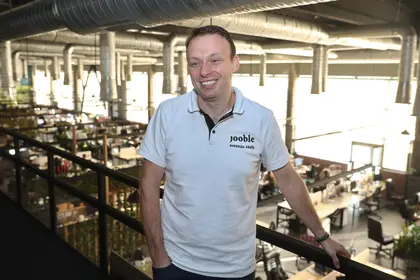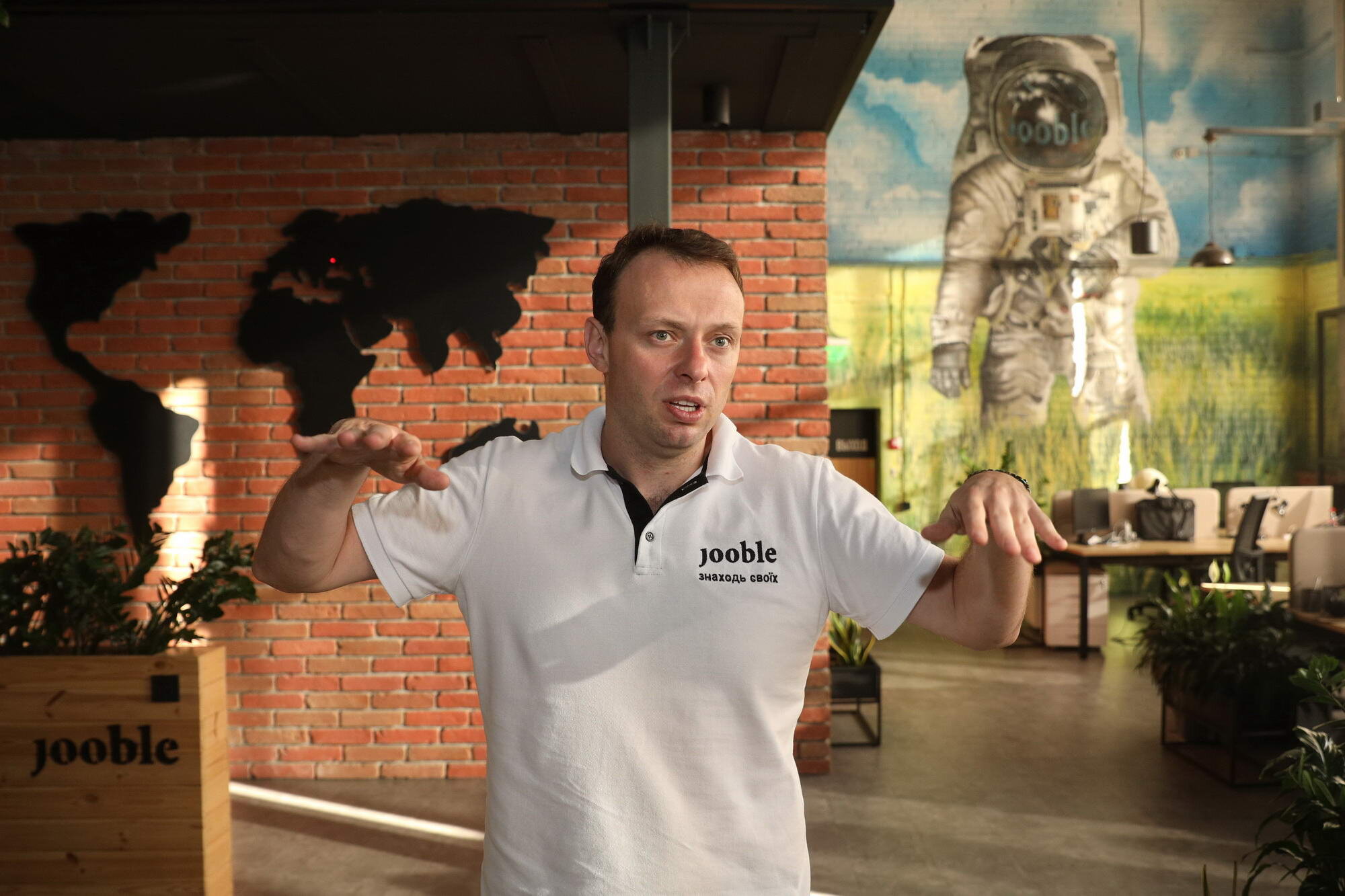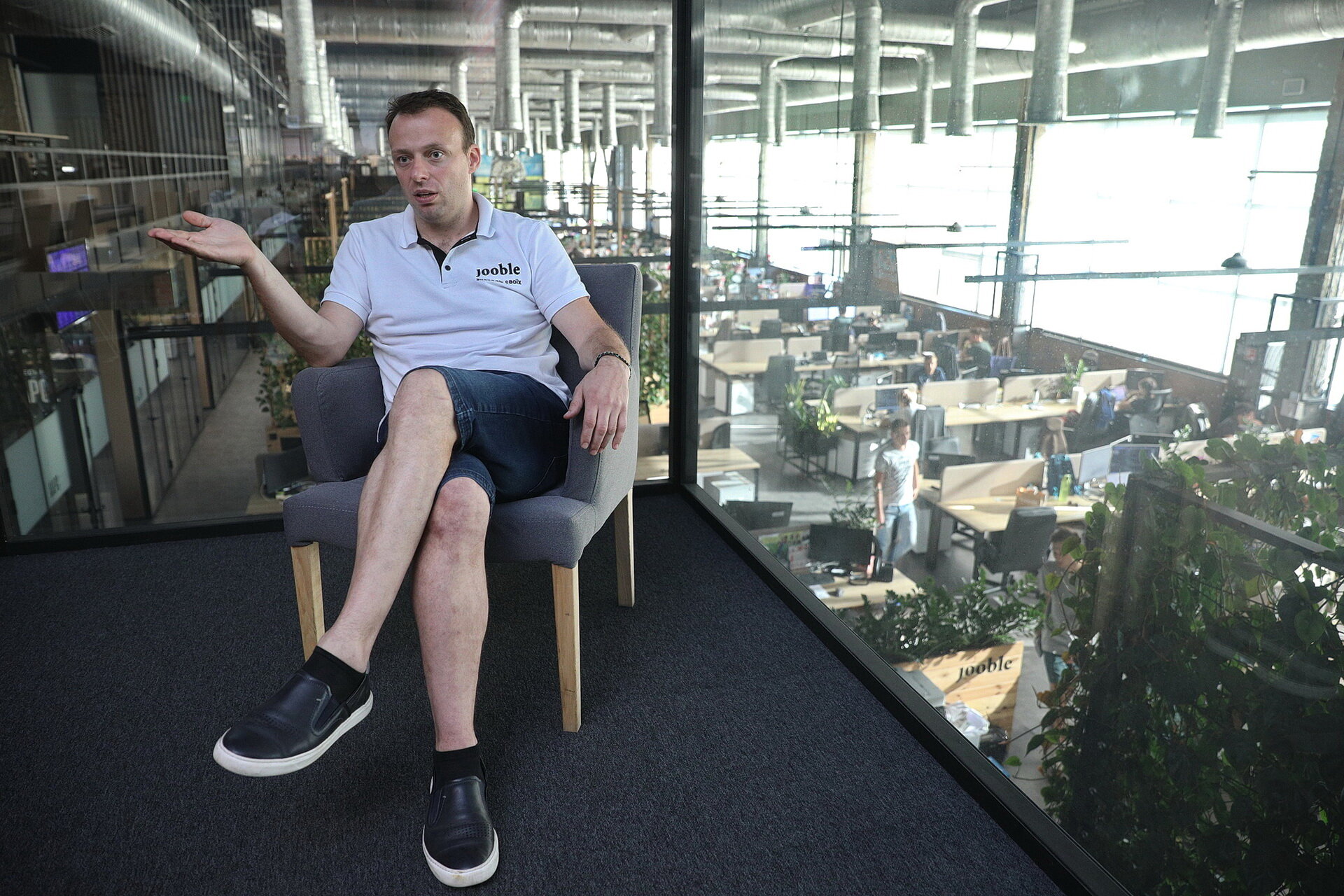Ukrainian techies from Jooble help people in 71 countries find a job online.
On its website, Jooble publishes nearly 700,000 vacancies a day — it collects them from the companies’ career pages, social networks and online bulletin boards. The platform makes a tedious quest for a job easier because its algorithm analyzes users’ behavior and offers exactly what they need — whether they want to work as a taxi driver in Kyiv or a software engineer at Google in the U.S.
- Receive the latest Ukraine news bulletins for today.
- Check out the freshest Ukraine news items as of today.
JOIN US ON TELEGRAM
Follow our coverage of the war on the @Kyivpost_official.
Although Jooble is a global company that has international partners like LinkedIn, it is registered in Ukraine and pays taxes in the country. Jooble doesn’t crave for foreign investments because the company can earn for itself, said Roman Prokofiev, the cofounder of the platform.
As for now, Jooble is the second-best platform in the world for jobs and employment, according to the analytical service SimilarWeb. Prokofiev said that he has managed to develop a successful business in Ukraine even though the country doesn’t have access to capital or big venture funds unlike in Europe or the U.S.
And Jooble strives to become even better:
“We want to be a starting point for those looking for a job,” Prokofiev said.
From rags to riches
Prokofiev and his partner Yevgen Sobakaryov built Jooble from scratch in the dormitory of the Kyiv Polytechnic Institute, where they both studied computer science, back in 2006.
They didn’t analyze the market, but decided to risk it and invested $50,000 of their own money into the business. Since then, the company has developed at its own expense, Prokofiev said.
Jooble took off because it was more convenient than local job search platforms that are usually similar to electronic newspapers — they only display vacancies advertised by the employers.
Jooble is also faster: It publishes new vacancies within 10 minutes after they appear anywhere on the web, so users are always up to date.
According to Prokofiev, Jooble offers ten times more vacancies than other platforms because it collects them from over 220,000 online sources, including social media pages, corporate websites and job boards.
For job seekers, Jooble is free because the company needs to generate a large audience in order to sell the redirects to other job search websites — that’s how the company makes money.
Jooble also charges Ukrainian employers: They pay a personalized fee per customer who has applied to the job to make their job more visible on the website. According to Prokofiev, this approach is more effective than the standard “pay and pray” model, when employers pay a fixed fee just to have their job listed on a website for a certain period, often 30 days.
Jooble is a profitable business — the company’s revenue is growing by 60% annually and the platform attracts nearly 100 million users every month. Jooble employs 500 specialists. Nearly half of them work from the office in Kyiv, while others manage the markets abroad. Jooble’s founders would not disclose the company’s revenue saying that it’s not a public company and that they do not want to sell their business.
“We just enjoy our job. We have challenges, and we can develop the company further,” Prokofiev said.
Business in Ukraine
Unlike other Ukraine-founded tech startups that register their companies in the U.S. or Europe, Jooble remains a Ukrainian business and pays local taxes.
Other companies move abroad for a reason — they want better legislation and more investments to become competitive on the global market.
Prokofiev and Sobakaryov thought they could build a successful business in their native country.
“We just accept the rules we have here and try to follow them,” Prokofiev said.
Ukraine, however, is not the strongest market for Jooble: The country is poor and local businesses do not invest in hiring like they do in Germany, China or the U.S.
“Business is people multiplied by capital,” according to Prokofiev. Ukraine lags behind both in capital and skilled professionals, he said.
On the local market, Jooble competes with Work.ua, grc.ua (HeadHunter Ukraine) and Rabota.ua — job search websites that are more popular among Ukrainians. These platforms work directly with employers who submit vacancies for a certain period and pay a fixed fee, while Jooble collects job offers from the internet using its algorithm.
At first, Jooble collaborated with Work.ua and exchanged its unique vacancies for a new audience. But it didn’t work out well as the two companies started competing for the same audience, according to Work.ua chief executive Arthur Mikhno.
“We realized that by giving all our unique content to another site, we are actually raising a competitor in the search result,” Mikhno said.
According to Prokofiev, Jooble’s model has a future because many companies like Google and Kyivstar do not use job boards to recruit. They publish new vacancies on corporate websites, but Jooble says that it knows about all of them.
Apart from that, Jooble also says that it understands its users as it gathers data and analyzes how users behave on a website: what vacancies are most popular and which professions are in demand.
The more users click, the more Jooble knows about them and the better services it provides, according to Prokofiev.
Global expansion
Jooble believes in its business and says that it is expanding globally. The Ukraine-born service has become popular in Eastern Europe. But in Jooble’s most profitable markets, like the U.S., competition is intense because there are other popular services like Indeed.
The language barrier also gets in the way. Usually, it takes nearly two months to adjust the job search engine to a new country. But in Asian and Arab countries, where languages are difficult and unfamiliar, the process is more complicated, Prokofiev said.
Every market also requires a unique approach, so Jooble changes its model accordingly. For example, China uses search engine Baidu instead of Google and internet regulation there is different from in Europe or the U.S. This is why Jooble’s business in China didn’t take off, according to Prokofiev.
But there are other affluent markets that Jooble is trying to conquer. Among the most profitable countries are Norway, Denmark, Finland, Germany and the U.K.
In Germany, for instance, Jooble offers over half a million vacancies and more than 400,000 are available in the U.K.
Pandemic hit
But the COVID-19 pandemic has delivered a blow to the company: The crisis led to massive layoffs in companies around the world and many people were afraid to apply for a new job.
Globally, the unemployment rate is unprecedented, Prokofiev said, adding that he believes Jooble can help in reversing the trend.
“We’ve never strived to be a number one. We just want to bring value to customers,” Prokofiev said.
You can also highlight the text and press Ctrl + Enter








